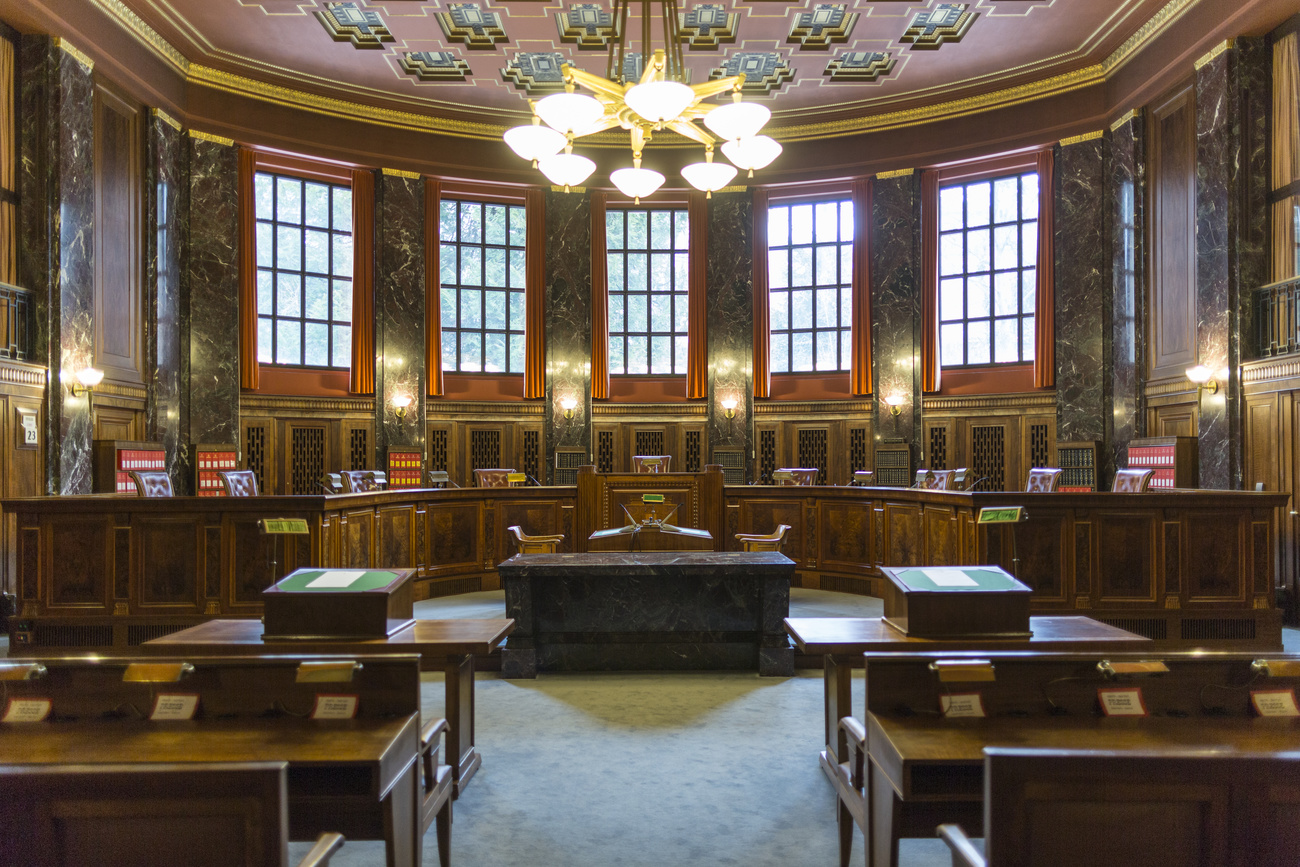
Opponents say ‘justice initiative’ has glaring flaws

The Swiss judicial system is not perfect, but it works very well: Senator Andrea Caroni, explains why he is fighting the ‘justice initiative’. And what its adoption would mean for the top court in the country.
The initiative wants to choose the members of the Federal Supreme Court to be chosen by lot rather than by parliament. Campaigners argue the reform would help de-politicise the election, limit the influence of political parties and strengthen the separation of powers.
Caroni is a lawyer and vice-president of the centre-right Radical Liberal Party. The Senator for Appenzell Outer Rhodes set up a committee against the ‘justice initiative’ and he is the speaker of the parliament’s court commission.
SWI swissinfo.ch: The initiators say that Switzerland has a serious problem with the separation of powers when it comes to federal judges. What do you say to that?
Andrea Caroni: That is a groundless exaggeration. You should know: The initiator (Adrian Gasser, editor’s note) has fought many lawsuits as an entrepreneur and was probably dissatisfied with their outcome before the supreme court. In my opinion, he believes the system is rotten because it has often ruled against him.

Be that as it may, no system is perfect, but ours works very well. We have a democratically legitimised, very diverse Federal Supreme Court that freely and independently passes judgements of high quantity and quality. What more do you want?
SWI: You yourself first wanted to draft a counterproposal to the ‘justice initiative’. So does it hit a sore spot after all?
A.C.: Of course, there is always room for improvement. As speaker for the parliamentary commission, which nominates the federal judges, I would say that it is possible to optimise the processes in certain areas.
For example, we could include an advisory body for particularly important elections, as we did for the new Swiss attorney general. Or we could introduce new instruments to structure our interviews with candidates more uniformly.
The initiators, on the other hand, have the feeling that judges are now politically at our mercy and that we can do whatever we want. That is not the case. You can see that from the fact that we always recommend everyone for re-election as long as they have not committed a massive breach of office, which hardly ever happens.
We therefore considered whether we wanted to formalise this practice even more clearly, for example by means of automatic re-election as long as there was no opposition against it. That would have been a possible fine-tuning of the system.
In the end, we decided against it. Where there are no real problems, there is no need to intervene. We have had a permanent federal court since 1874. Since then, there have only been three cases of non-re-election: Twice because judges did not want to abide by the then informal – and now legal – age limits. The third time was an operational accident, and the judge was re-elected a week later after all.
This shows how incredibly resilient the system is to political games.
SWI: Criticism also comes from abroad, including from the Council of Europe’s GrecoExternal link – the Group of States against Corruption. The Swiss judiciary is too politicised. What do you think of this judgement?
A.C.: In my opinion the Greco members don’t really understand Switzerland. We have a completely different political structure than almost all other countries. Most of Greco’s member states don’t know our consensual democracy, in which all forces up to the government are involved.
We apply the same system with the courts. As an image of direct and semi-direct democracy, all opinions are included as far as possible, and this diversity results in balanced judicial bodies whose judgements are also widely accepted by the population.
Incidentally, the judges do not feel that they are being bullied. On the contrary, they feel strengthened by the existing system, because it gives them indirect popular legitimacy via parliament.
For them, this is a backing, which is confirmed to me again and again in personal conversations. And there is never any talk of pressure from their parties anyway, too much is read into it.
SWI: It is said that party representation in the election of judges serves to reflect the entire political spectrum. In Switzerland, however, only about 7% of the population is represented in a party. Is that not problematic?
A.C.: This argument is a smoke screen. The point is not to map party memberships, but values. Parties are ultimately only a means of capturing these. We also look at a number of other characteristics in the selection process: Age, gender, region, professional background. And, of course, language, which, by the way, is the only point that the initiators themselves thought of.
Moreover, you don’t have to be a party member. It is enough for someone to declare their party-political affinity so that we can roughly classify them in the political spectrum. In our political landscape, there is a party for practically every view.
SWI: The initiative also calls for a permanent expert commission appointed by the government to propose judges for election. Wouldn’t that be an acceptable change?
A.C.: It is not a question of whether the current system is perfect or not. It’s about whether the present initiative improves it or not. And it is precisely in the case of the expert commission that one can see that it has glaring deficiencies.
For the initiators, all of us on the court commission are susceptible to corruption and engage in post-hopping. The government, however, is supposed to conjure up a body of experts out of the hat that is beyond reproach: How should it be composed?
Who is to be appointed on the basis of what criteria? The initiative says nothing about this, it is a complete black box.
There are 17 parliamentarians on the court commission, from the left to the right, which is a good political cross-section. We all keep an eye on each other and work transparently – quite different from what a commission of experts without democratic legitimacy and with too much power would do.
Ultimately, the initiators reveal a very technocratic understanding of the state: the lot goes through a machine, the expert commission consists only of ‘experts’, and only the executive should be able to appoint them. That is elitist and does not fit in with our democratic, popular institutions.
SWI: One of your Radical Party colleagues has submitted a proposal to parliament that wants to abolish the controversial so-called mandate tax. Do you welcome this move?
A.C.: This tax is massively overrated and quite wrongly portrayed as a means to buying office. The contributions to a political party are fixed and can neither be increased by the judges – for example, to ‘bid’ for a post – nor, conversely, can a party buy judgements.
This is neither corruption nor the purchase of office, but simply a contribution to the organisations that help organise political life in this country – largely through voluntary work.
Incidentally, it is open to all parties whether they want to do this at all.
SWI: There are also plans for a lottery to decide who among the proposed judges will get the job.
A.C.: It is totally demotivating for the judges, I think. They may have had a brilliant career and not be elected because the lottery selects someone else who is obviously less qualified. Instead of selecting the best, we leave it to chance, which supposedly makes better judgements than the political leaders.
Moreover, no one guarantees diversity in the courts any more, and a few experts in the expert commission would have all the power.
By the way, there is one last tricky point about the initiative, a somewhat technical one.
SWI: Which one is that?
A.C.: The initiative only addresses the election procedure for the Supreme Court. It was forgotten that all other courts in the country would remain in the current system with party representation. If the initiative were to go through, we would only have the lottery procedure for the 38 federal judges, who would all be party-related thanks to their previous judicial careers.
Let me put it this way: We have a solid house that has stood the test of time for almost 150 years. We could perhaps repaint it here and there, but it is not generally in need of renovation. The initiative, on the other hand, wants to tear it down completely and then just put a roof on it that is also slanted.
Interview adapted from German/urs
Karin Stadelmann explains why she is in favour of the ‘justice initiative’.

More
Election of judges: Campaigners say system is flawed

In compliance with the JTI standards
More: SWI swissinfo.ch certified by the Journalism Trust Initiative





























You can find an overview of ongoing debates with our journalists here . Please join us!
If you want to start a conversation about a topic raised in this article or want to report factual errors, email us at english@swissinfo.ch.